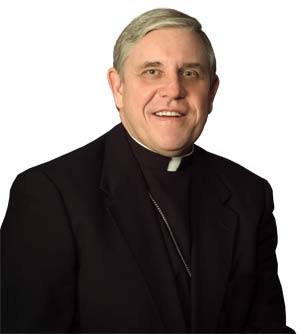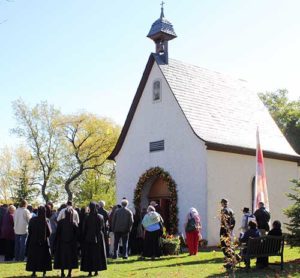 I was invited to address members of MAREDA (Milwaukee Archdiocese Religious Education Directors Association) and PMMA (Pastoral Ministers of the Milwaukee Archdiocese) last Tuesday, Feb. 14, at St. Mary Parish, Hales Corners. It is always a pleasure to address those who have such vital ministries in shaping the parishes.
I was invited to address members of MAREDA (Milwaukee Archdiocese Religious Education Directors Association) and PMMA (Pastoral Ministers of the Milwaukee Archdiocese) last Tuesday, Feb. 14, at St. Mary Parish, Hales Corners. It is always a pleasure to address those who have such vital ministries in shaping the parishes.
Many individuals haven’t thought about the catechism since high school or grammar school. Yet the basis of understanding the faith should be followed up by an integration of the church’s teachings into one’s life.
I am aware of the obstacles facing the presentation of the church’s teachings in our modern society. For a number of decades, the support of cultural Catholicism that we took for granted, for the most part has disappeared.
We now face the implementation of “secularism” in every aspect of our religious and civic communities. The deceptiveness of secularism is its subtleness under the guise of “neutrality.” There is an acceptance that society must adhere to in order to ensure individual freedoms.

Members of the Schoenstatt Community gather in Waukesha, Oct. 14, 2014, to celebrate the 100th anniversary of their organization. In his Herald of Hope column, Archbishop Jerome E. Listecki praises groups like the Schoenstatt Movement for the way they live their faith in a disciplined manner publicly. (Catholic Herald file photo by Peter Fenelon)
Yet it is not “neutral” at all but is based on accepted preconceived notions, which may be challenged by religious values and understandings. In planning events – be they public celebrations or public school sporting or drama presentations – for many, Saturday or Sunday worship is rarely considered.
This is the environment that today’s directors of religious education, catechists and pastoral ministers find themselves confronting. Battling technology and the internet for attention of the students was something previous DREs, catechists or pastoral ministers did not have to consider. The landscape has changed and navigating the course of teaching demands a creative presentation and collaboration discovering new avenues.
The teaching aspect of the church is not an option. The great commissioning tells us, “Go therefore, and make disciples of all nations, baptizing them in the name of the Father, and of the Son and of the Holy Spirit, teaching them to observe all that I have commanded you.”
We cannot retreat from this mandate and must discover ways to challenge those Catholics to deepen their faith through knowledge and understanding. It is a mandate not just for bishops, priests, deacons and religious but for us all.
The relationship that people have to their faith differs greatly. Some have a very secure relationship, others belong but are still trying to figure out what the role of being a Catholic means in everyday living and still others are in need of pre-evangelization. Oftentimes, these are good people but do not understand the need for the spiritual in their lives.
You notice I have not even addressed the problem of outreach to those who are indifferent to Jesus and the church.
Having presented the problem, let us step back and address our teaching concentration. Being in a countercultural mode, one of the most significant aspects we can achieve for those who are under our care is to develop a relationship with Jesus. Remember, his disciples asked him to teach them to pray.
Praying keeps God in the forefront of our lives. Second, to develop a relationship with the church if we really wish to understand Jesus, we can only achieve it through the church Jesus gave us, the church the Holy Spirit is given to the church and the church is there to lead us to salvation.
“When he comes, the spirit of truth, he will guide you to all truth.” (Jn 16:13)
Lastly, our relationship to the mission, knowledge of the church’s teachings requires we share his love with family, friends and our world. I give you a new commandment to love one another as I have loved you.
I know that it sounds like an almost insurmountable task, but there are signs of hope. The popularity of Pope Francis is a reminder that those who live the faith make a difference in the lives of our communities. His Year of Mercy certainly demonstrated a renewed enthusiasm and energized the corporal and spiritual works of mercy.
The importance of pietistic groups, people who desire to live the faith in a disciplined manner publicly and integrate it into their lives fuels a dedication, which the church needs. We are rich in various groups and religious practices in the archdiocese. Men of Christ, Women of Christ, the Rosary Evangelization Apostolate, the St. Jane de Chantal Society, Roses for Our Lady, the Carmelites at Holy Hill, the Schoenstatt community as well as the religious affiliation with the Franciscans, just to mention a few.
Another hopeful sign is the 2014 Synod as it continues to be an energizing force calling the faithful to address the priorities established by the delegates. Participating in the programs established by ASIC (Archdiocese Synod Implementation Commission) will offer a common approach at shaping the church and offer dividends for our future.
We worry that church attendance is decreasing, reception of the sacraments declining and baptized individuals are failing to identify themselves as a Catholic. We can allow ourselves to be immobilized or we can take up the challenge and as believers profess that the only hope for our country and the world is Jesus Christ. It begins with us.
We are believers; we should pray every day, be involved with our parishes and never be afraid to challenge family and friends.
Our DREs, catechists and pastoral ministers will assist us on our journey; we need to support them creating mutual support and growing our relationship to Jesus, the church and our mission.
